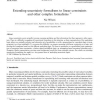Free Online Productivity Tools
i2Speak
i2Symbol
i2OCR
iTex2Img
iWeb2Print
iWeb2Shot
i2Type
iPdf2Split
iPdf2Merge
i2Bopomofo
i2Arabic
i2Style
i2Image
i2PDF
iLatex2Rtf
Sci2ools
IJAR
2008
2008
Extending uncertainty formalisms to linear constraints and other complex formalisms
Linear constraints occur naturally in many reasoning problems and the information that they represent is often uncertain. There is a difficulty in applying AI uncertainty formalisms to this situation, as their representation of the underlying logic, either as a mutually exclusive and exhaustive set of possibilities, or with a propositional or a predicate logic, is inappropriate (or at least unhelpful). To overcome this difficulty, we express reasoning with linear constraints as a logic, and develop the formalisms based on this different underlying logic. We focus in particular on a possibilistic logic representation of uncertain linear constraints, a lattice-valued possibilistic logic, an assumption-based reasoning formalism and a Dempster
Related Content
| Added | 12 Dec 2010 |
| Updated | 12 Dec 2010 |
| Type | Journal |
| Year | 2008 |
| Where | IJAR |
| Authors | Nic Wilson |
Comments (0)

